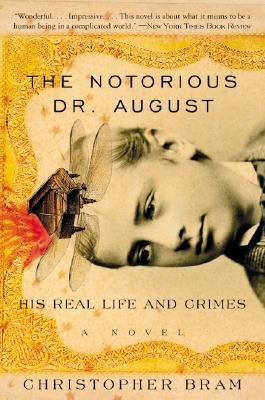 The Notorious Dr. August: His Real Life and Crimes
The Notorious Dr. August: His Real Life and Crimes
by Christopher Bram
Published by Harper Perennial
Published May 22, 2001
Fiction (historical)
498 pgs. • Find on Amazon.com
Reviewed by Stephen O. Murray
June 6, 2000 and June 20, 2000.
Although he read way too long from The Notorious Dr. August (also a very long book), I liked Christopher Bram. He grew up in Virginia and exudes the shy charm of polite Virginians. It was a relief to see a writer not in black. Bram wore a plaid shirt that I thought clashed with his sports coat. Blue jeans, Nike sneakers. He had graying but full hair. He needed to switch glasses to read.
Asked about models for writing historical fiction, he replied that he had not really thought about The Oldest Living Confederate War Widow while writing it, but that Gurganus, whose writing he greatly admires, showed with an even wilder book what can be done. He also said he admired Russell Banks, but deliberately waited until he’d finished with galleys before reading Cloudburst. War and Peace and The Red and the Black are the great models for writing about the past without getting bogged down in research. Less obvious is Vanity Fair, which was written about an earlier time.
Although inspired by a real figure, after feeling constrained by the facts in Father of Frankenstein, Bram wanted the freedom of fictional characters. And, I’d guess, he wanted to write about an edgy black-white male relationship.
Bram said that the image of naked young men lounging in and by the river had been with him for a long time, and that he’d long wanted to write a Civil War novel. I suggested that he had written a Civil War story (all of which he’d just read to us) and asked if he still wanted to write a Civil War novel. He thought this, particularly using the opening scene, might have quenched that thirst. He started with those characters, not with a master plan for the whole (sprawiling? epic?) book.
Before the reading, Bram was talking with Kirk Read (a fellow Virginian) about the extreme discretion (closetedness) of Reynolds Price, even after his AIDS novel, Promise of Rest.
6 June 2000
I nearly bogged down in reading Bram’s [then-new] novel, when large chunks of Alice’s diaries appeared. The opening Civil War story is a tour de force: an Ambrose Bierce story told by a young proto-gay narrator. It is followed by a grimmer variant of As I Lay Dying. With some echoes of Steppenwolf, the spirtualist pianist and the moralistic ex-slave he loves move from New York to Europe and land in Anne Rice territory when they cross the Bosphorus.
Fitz/Dr. August seems a bit anachronistic in his insights and his syntax, but these make for easier reading in the 21st century. Bram skillfully brings a range of milieux to life, as well as a family that is very nontraditional in many ways but is also very Victorian in its mix of devotion, frustration, and loneliness.
Many of the backdrops are glitzy, but the central relationships of this inter-racial triangle are seriously limned. At least this reader longs to know what Tristan makes of this narrative of his background—although Christopher Bram seems far to protean a novelist to undertake a sequel.
Most writers grow accustomed to being misunderstood. They simply hope they’ll be misunderstood in their favor.
—Bram, in a B&N interview (1997?)
20 June 2000
©2000, 2016, Stephen O. Murray

